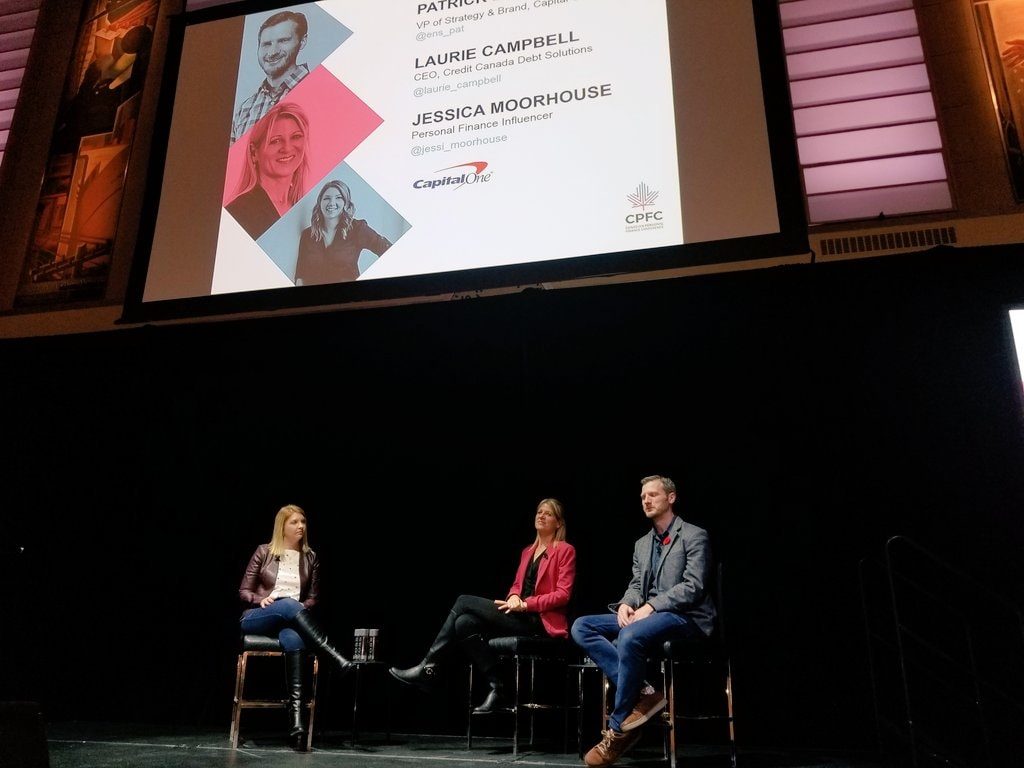This week is Credit Education Week and this year’s theme is money mindfulness!
As you may already know if you follow me on Instagram or are on my email list, two weeks ago I was lucky enough to have moderated a panel discussion at the Canadian Personal Finance Conference with Laurie Campbell, CEO of Credit Canada Debt Solutions, and Patrick Ens, VP of Strategy & Brand at Capital One Canada. Here’s a photo to prove it!

Not only that, I got the chance to talk with Patrick one-on-one for an episode of my podcast.
You can listen below to hear us discuss the positive impacts of being more mindful in your financial life.
Money Mindfulness Is Just as Important as Having a Budget
Now, even though money mindfulness is the theme for Credit Education Week, it’s still a very new subject in the realm of personal finance. That’s why I felt so fortunate to work with Capital One Canada in promoting this very crucial aspect of financial literacy this year.
Just like having a budget, tracking your spending, and tracking your net worth are key components to knowing exactly what’s going on with your money, practicing money mindfulness should be something you do just as regularly.
You see, by being more mindful of your money, you become more in control of your money. I’m not just talking about being more conscious with your spending either, but also more level-headed with your investments as you watch the markets go up and down, and more confident when making tough financial decisions.
Money Is Part Math, Part Psychology
The reason why money mindfulness is just as important as having a budget is that personal finance is only part of math, the other part is straight-up psychology.
If being good with money only meant following a few rules of thumb and using a spreadsheet, we’d all be amazing at money! But we’re not. That includes me too! I’ve spent the last 7 years studying and creating content about money, and guess what…I STRUGGLE WITH MONEY TOO!
That’s right. I’m not perfect. Not at all! I still make mistakes. And most of the time I make mistakes because I’m not being mindful of what I’m doing. I’m just mindlessly swiping my credit card without much thought to the consequences.
Then, once I take a look at my credit card statement, can you guess what I feel? I sure don’t feel good! I feel shame, I feel regret, I feel like I let myself down. The only way to combat those negative feelings surrounding money is by taking that extra step to be more mindful of every single financial decision.
Canadians Spend 7 hours Per Week Worrying About Their Finances
Here’s a crazy stat from a survey conducted by Capital One Canada and Credit Canada Debt Solutions. Canadians are currently spending 7 hours per week worrying about their finances. That’s 365 hours per year worrying about money! What a waste of time!
Do you know how much awesome stuff you could be doing with your life if you had an extra 7 hours per week to not worry about money? You could learn a new skill, go to the gym every day, and get an extra hour of sleep per day!
The thing is, I know worrying about money is incredibly common. I know because I talk with people like you all the time and that’s the one consistent thing that always pops up. You’re worried about not having enough to retire on. You’re worried you won’t be able to afford to buy a home. You’re worried you’ll never be able to pay off all your debt. I’ve heard it all.
Worry is a powerful feeling. It can stop you right in your tracks and halt you from progressing in your life for years. I should know. I used to be a chronic worrier. Seriously, for years I felt frozen and didn’t take any risks or try new things because I was terrified that one day something terrible would happen. I would keep asking myself “What if?” and always think of the worst-case scenario. The step I missed was making a plan to deal with any “What if?” scenario.
The Solution to Financial Worry Is Financial Literacy
I know it may sound corny, but it’s true. The only way to stop worrying about money and gain financial confidence is by educating yourself and making a plan for your finances. That means not handing off your finances to someone else to “deal with”. It means taking that extra time to learn, implement and be mindful of every future financial decision you have to make.
Over the past 3 years, I’ve become so much more certain with my money thanks to taking the time to educate myself about aspects of finance that used to scare me. Sure, I worry about money sometimes, that’s only natural. But in general, I don’t spend that much time anymore thinking about my money. I spend 1-2 hours per month updating my spending and net worth trackers and checking my budget, and maybe another 30 minutes making sure all my bills have been paid. But that’s it. I actually spend most of my time thinking about other people’s money, which to me is actually fun!
My Money Mindfulness Challenge to You
To leave things off, here is my challenge to you. If you read this post and know deep down that you’re not being mindful with your money and you probably do spend 7 hours per week worrying about your finances, I challenge you to do the following 6 action items:
- Make a plan for your finances. That means setting up a budget, tracking your spending every month so you know where your money is going, and tracking your net worth every month so you know how your finances are progressing.
- Look at your spending to find your problem areas. Find out what you’re spending the most money on to gain some much-needed clarity.
- Get a post-it and write down the top 3 things you overspend on. Then, put it in your wallet. This will serve as a reminder to NOT spend on these things moving forward.
- Delete any investment apps on your phone so you aren’t checking them all the time. If you’re a big worrier when it comes to your investments and freak out when the stock market takes a big dip, you need to remember that you’re investing for the long term. So stop checking your investments so often! This will help you stay the course and prevent you from making some poor investment decisions.
- Check your credit score. If you don’t currently know how creditworthy creditors think you are, use Capital One Canada’s free credit score service to find out your Transunion credit score.
- Join my Facebook group. A great way to combat worry is by realizing you’re not in this alone! Because you’re not! We’re all doing that same thing, so take part in a community that’s all about fostering financial literacy and helping each other out.

“Delete any investment apps on your phone so you aren’t checking them all the time.”
YESSS! Checking your investments on a daily basis will make you sad. Markets go up and down regularly, if you check too often you’re going to see your net-worth go down about half the time! If you only check once per month, or even once per year, chances are you’ll see your net-worth increasing, which feels great.
My wife and I check our net-worth once every 4-months. We call it our “financial check-in”. We crack a bottle of wine, order some take out, and we go over our budget and investments (slightly nerdy I know). It only takes 1-2 hours and outside of those check-ins we rarely talk about finances. It’s GREAT! Highly recommend it to couples.
Yup, that’s what my husband and I do, though we do it once per month, and also check out spending and budget. But it takes hardly anytime then we rarely talk about money in between because we got everything talked about at our monthly money meeting.